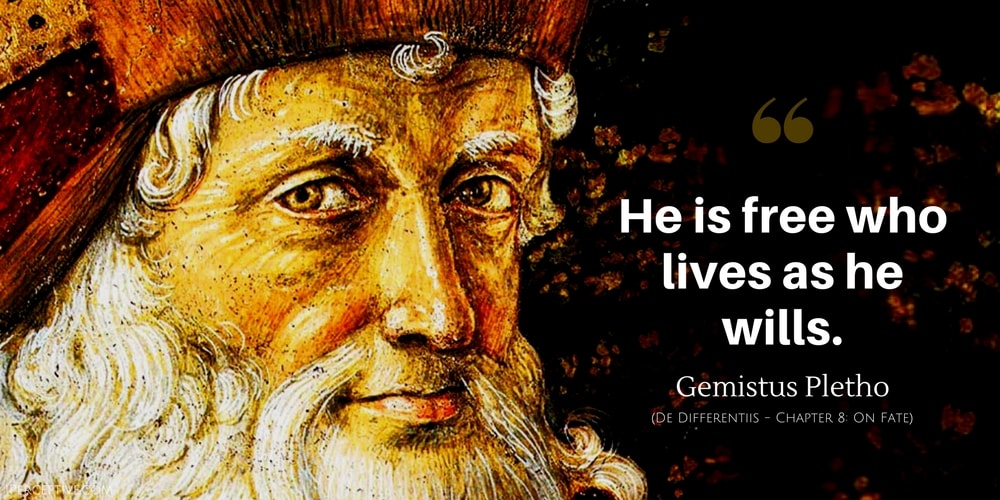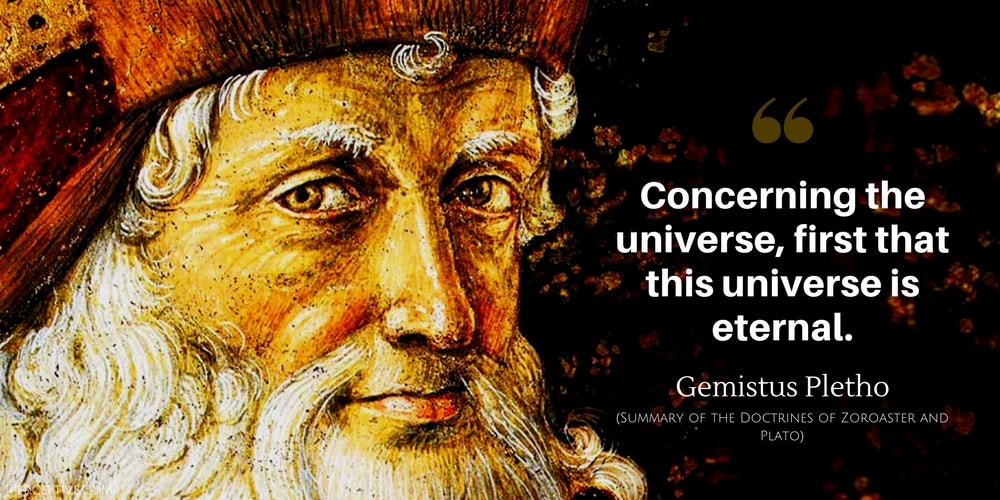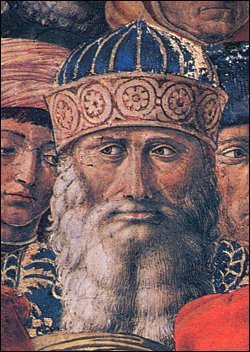Gemistus Plethon Quotes

He is free who lives as he wills.
Things assigned must be proportionate to those to which they are assigned, if the assignment is to be appropriately made.
It is not possible for something that does not yet exist, nor has been placed in the order of the things that exist, to become the cause of what already exists.
And even if in art there appears to be an element that does not deliberate, such as an instrument or an assistant, it is not in them that art lies, but in the director of works.
For if art imitates nature, as Aristotle himself teaches, then nature should not be inferior to art. On the contrary, nature must possess that which constitutes art in a far superior and elevated way.
Similarly, if one observes something irrational in nature, then the nature that accomplishes the work certainly does not lie therein; for nature is a divine institution and a divine institution cannot be irrational.

Concerning the universe, first that this universe is eternal.
Beyond doubt all things are determined. For if any event were to occur without being determined, either it would occur without its cause, and there would therefore be something which came into existence uncaused; or the cause which produced it would be operating in an indeterminate fashion, subject to no necessity, and there would therefore be a cause which did not produce its effects in a necessary and determinate fashion. Neither of these alternatives is possible
Furthermore, if future events have not already been determined, there could be no foreknowledge of them not only by men, but also by any of the gods, since it is impossible that there be knowledge of what is absolutely indeterminate; for it would not be possible to decide which member [of the contradictory pair] is true, and to say either that such-andsuch will happen or that it will not. As it is, the gods surely do know future events, since they also determine them
Plato's view is that God, the supreme sovereign, is the creator of every kind of intelligible and separate substance, and hence of our entire universe. Aristotle, on the other hand, never calls God the creator of anything whatever, but only the motive force of the universe... Aristotle does make God the end and the final cause; but even this must be regarded as a not very exalted claim and not one worthy of God, if he makes God the end not of the existence or essence of particular things but only of movement and change.
Concerning we ourselves, first that our soul, being of like kind to the gods, is immortal and remains in this universe the whole time and is eternal. Next that the soul is sent down for the purpose of partaking in a mortal body here each time by the gods, at one time in one body, at another in another, on account of the harmony of the universe. That, even though we have a share in mortal things, one thing in us is from the immortals and this is our form. In this way, the universe itself is united to itself. Next that the good is in us, naturally by our ties to the gods, and this is the fit end of life. In addition to all this, that our happiness is in our immortal part, put there by the gods who unite our kind, and that is the substance and most important part of man.
Quotes about Pleton
Among the indispensable names, the earliest one is the Byzantine philosopher George Gemistos (1355/60–1452?), who came to call himself Plethon. He arrived in Florence in 1437, at the occasion of the Council of Ferrara and Florence, where the Eastern and Western churches were trying (unsuccesfully) to overcome their differences and unite against the threat of Islam. Plethon, who was already around 80 years old, was a living embodiment of what we have referred to as Platonic Orientalism, and impressed the Florentine humanists with his first-hand knowledge of Plato and Aristotle. He highlighted the code of theurgy, the Chaldaean Oracles, as a supreme example of the superior religion of the ancients that he believed had been inherited by the Platonists, and he claimed (incorrectly, of course) that they were written in very ancient times by none other that Zoroaster, the chief of the Persian Magi. This was the opening shot in a long history of Western fascination with Zoroaster, who came to be imagined as a supreme authority of ancient wisdom.

